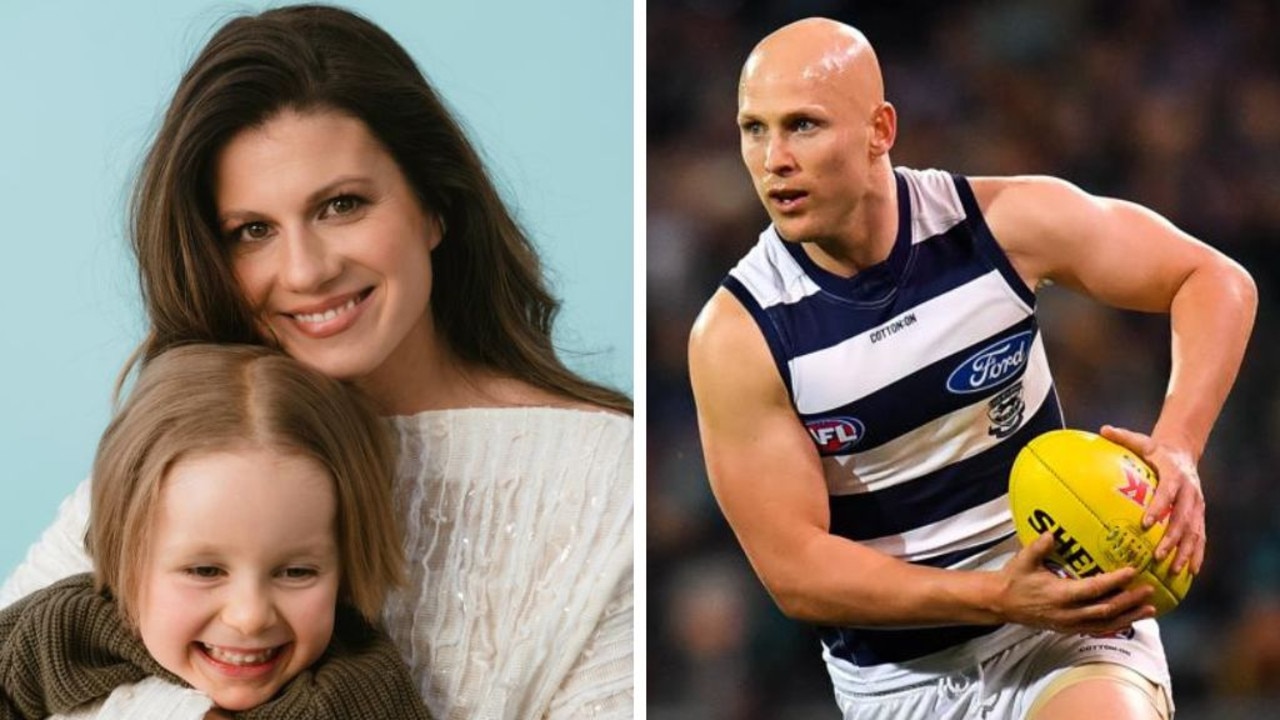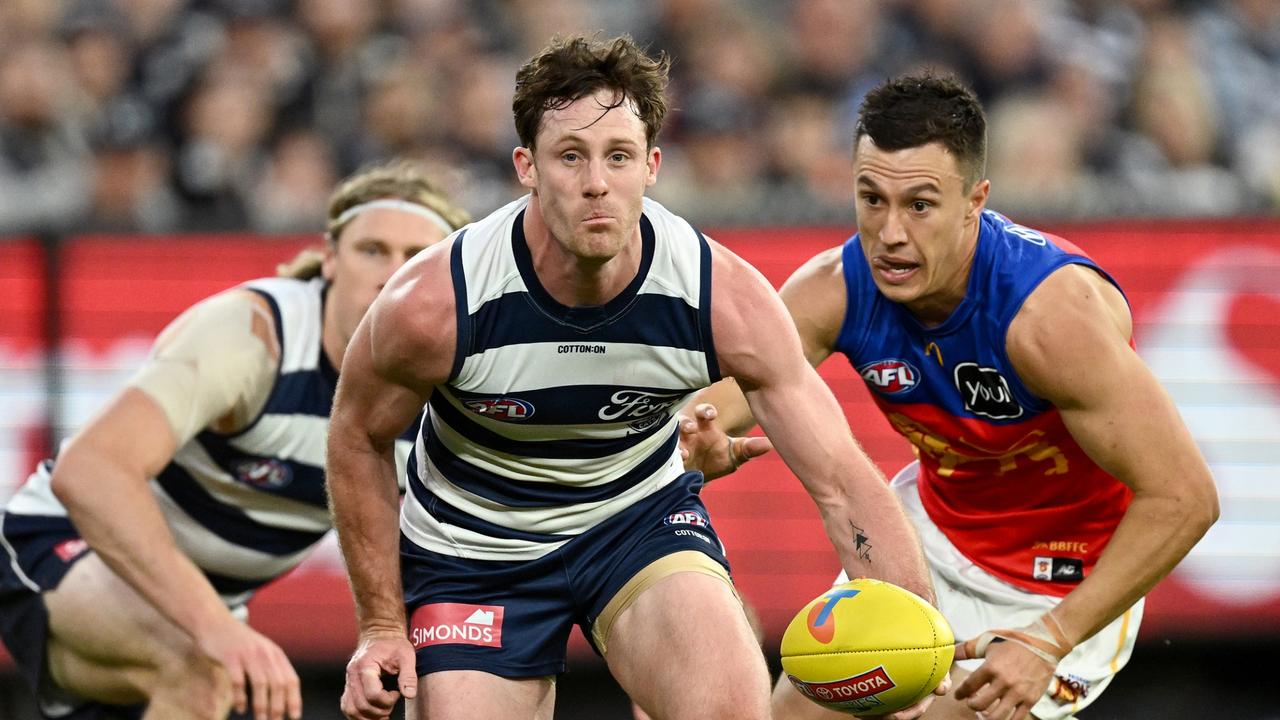Former Port Adelaide star Brad Ebert opens up on league’s concussion protocols, retirement and life after footy
The courageous act in last year’s final both typified Brad Ebert’s career and ultimately ended it. The former Port star opens up on his concussion battle and life after footy.
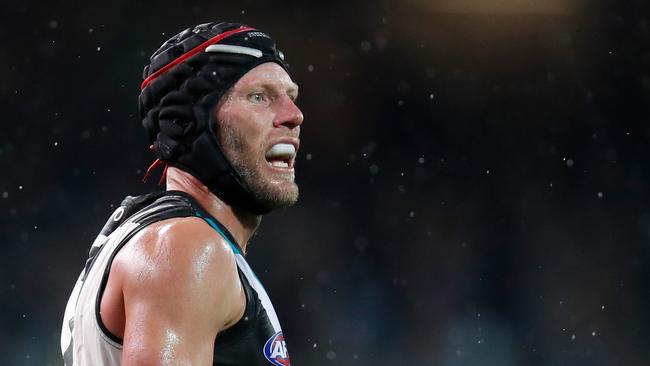
AFL News
Don't miss out on the headlines from AFL News. Followed categories will be added to My News.
Brad Ebert’s two former teams are playing in what shapes as a Saturday night blockbuster, but the TV is not even on.
Instead, the ex-Port Adelaide and West Coast midfielder is having a few beers and laughs with mates at his shack at Willunga to celebrate his birthday.
Retirement has been forced on the 31-year-old after repeated concussions, but he is content.
Satisfied with not playing in the Round 3 match in Perth and with moving onto the next phase of his life.
“I’d check the phone for the score every now and then but that’s as much as it went,” Ebert tells The Advertiser, in his first lengthy interview since retiring.
“I was there with some friends and family, and I didn’t even think twice about not watching.
“It wasn’t like the result was causing me any stress.
“The only thing was I was a bit surprised at the (37-point) margin.”
Six days later, Ebert is not only tuning in, he is near the edge of his couch at home.
Port Adelaide is playing Richmond at Adelaide Oval – a clash that brings back memories, though only some.
Ebert’s 260th game and swan song was the Power’s preliminary final against Richmond in October.
Watch the 2021 Toyota AFL Premiership Season. Every match of every round Live on Kayo. New to Kayo? Try 14-Days Free Now >
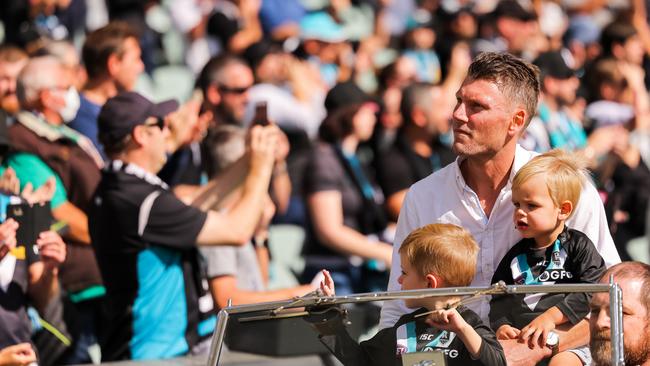
Watching last Friday’s match with his three-year-old son, Leo, Ebert plays the role of supporter and educative father, in between reflecting on his career and exit.
“It was a bit weird,” he says.
“Just the fact you know it (the previous Power-Tigers game) was it – it was very final and you know you’re never going to play football again.
“It certainly wasn’t with regret or any sadness, I was just a bit more up and about.”
When Robbie Gray kicks what proves the matchwinning goal, Ebert is pumped.
“It was invigorating, bloody oath,” he says.
“You get those feelings ‘it would’ve been all right to have been out there’.”
When Leo asks questions, he does his best to answer them.
“This year he’s starting watching footy a bit more and getting into it a bit more, so you’re putting some context to it,” Ebert says.
“I sat down there with him and I was like ‘I played against these guys’.
“His favourite number’s number 7, so he knows that’s my number and what I wore.
“He’s asked a few times ‘daddy, why don’t you play football no more?’
“I said ‘I’ve had to retire, I got a few too many head knocks’ and keep it to that.”
Ebert’s final act on the field will long be remembered by footy fans.
Ironically, Ebert’s recollections of the moments preceding and following his courageous spoil that likely stopped a Jack Riewoldt goal are scant.
The team-first effort to go back with the flight of the ball both typified Ebert’s career and ultimately ended it.
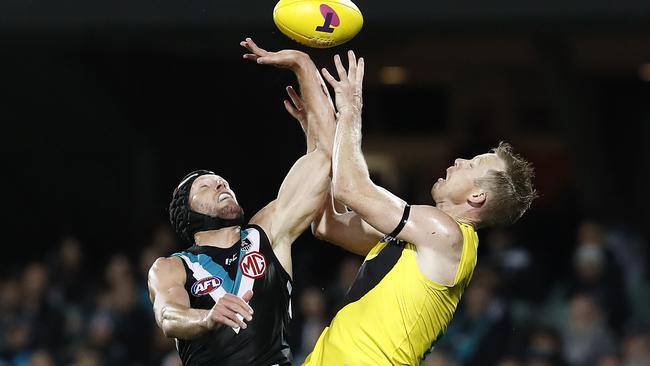
He re-watched the preliminary final just after Christmas to jog his memory.
“I was curious to see how it all panned out, wanted to see who’d won,” he jokes before following with another gag.
“I didn’t just fast-forward to that last act and think ‘what a legend’.
“I watched it in full.”
Ebert does recall sitting on the bench after the incident, concerned about not having much feeling in his legs.
“I had really wobbly legs and was a bit nervous about that,” he says.
“I remember walking out to shake a couple of hands, so I wasn’t completely out of it, but it was really blurry and very scattered.
“As soon as the siren went I knew because I was concussed, that was it.”
Ebert concedes he probably would have retired after getting concussed in Round 9 against Melbourne if the Power had not been in the premiership hunt.
Estimating he had been concussed more than 10 times in his career, but fewer than 20, he copped a knock early last year that “started making me a little wary”.
“I was having some reactions I shouldn’t be getting, lingering headaches and waking up groggy,” he says.
Then COVID hit.
The competition’s eight-week hiatus gave Ebert time to recover.
A month later, retirement was suddenly a consideration after the knock against Melbourne.
But he got the all-clear to keep going from Power doctor Mark Fisher and wife Bec, as he chased an elusive flag.
The caveat was if he had one more head knock, he had to pull the pin.
“If we were in the Crows’ position (last year) … I probably would’ve retired after Round 9,” he says.
“Seeing how the team’s going, I was adamant I wanted to get back to see it out at least.
“There were some pretty full-on convos.
“By the end the symptoms were lasting longer, the incidents were probably getting less to cause concussion.
“Bec (a sports physio) was living with me and seeing some of the side-effects.
“But she’s well educated, evidence-based, so could see both sides of it and was OK with the path we were taking.”
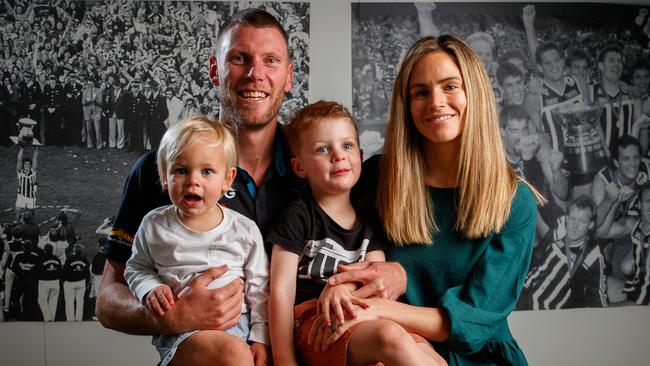
Ebert went into the back half of last season without a contract beyond 2020.
His management and the club had been discussing a new deal but the Round-9 concussion put talks on ice.
Getting dropped for rounds 15 and 16 added more uncertainty.
Then he returned for the last two minor rounds and was back in form, booting 2.2 against both Collingwood in Round 18 and in the qualifying final versus Geelong.
He reckons he would have been a good chance to receive a contract for 2021 if not for that final concussion.
Due to that head knock, coach Ken Hinkley was never going to let Ebert play in the flag decider, even if the Power had won.
Not that Ebert has any regrets about putting his body on the line that last time.
“You’re suffering through the year through different bits and pieces, but I never really thought about it – you’re in the moment,” he says.
“I was certainly playing with the thought ‘if, if, if’, but I was trying to play as free as I could.
“I was so driven from a football sense that I was just doing everything to try and win and play well, and that’s how I guess I’m wired.
“It certainly wasn’t a form issue (that led to retirement).
“That’s why you walk away confident I would’ve had another couple of years in me, easy, but that doesn’t really faze me.”
Brad Ebert has been helped off the field after putting his body on the line in this spoil ðŸ‘#AFLFinalspic.twitter.com/zlvg6E5KCk
— AFL (@AFL) October 16, 2020
Ken Hinkley's speaks on the retirement of Brad Ebert â¤ï¸#AFLFinalspic.twitter.com/UfrNcSlrje
— 7AFL (@7AFL) October 16, 2020
The lasting image of Ebert will be that desperate spoil against the Tigers in his helmet.
But he reckons he only wore his headgear six times.
“I put the helmet on more just out of confidence and comfort … and it felt like it was causing glancing blows, rather than real knocks,” he says.
“It’s not like I was wearing it a lot but that’s the funny thing that gets remembered.”
The helmet is now at the bottom of a drawer with other keepsakes, including guernseys.
“Not that my items would be worth much, but if I give it to a charity like the Hutt St Centre or MND SA wanted them, I could always sign them and help them out,” he says.
His headgear will not get worn anymore due to doctor’s orders never to play footy again at any level.
“It’d be fun to go play in the country … with a bunch of mates,” he says.
“But the risk is certainly not worth the reward.
“I’m not overly in love with footy that I’m desperate to keep playing and hang on forever.
“I’m fine keeping fit by going for a jog this morning, doing some weights at home.”
Ebert is now getting his football fix via a weekly spot on Triple M’s Saturday breakfast show and upcoming commentary stints with the station.
It has meant watching more games than during his career.
Given his own experiences, he is sensitive to incidents, such as Crows defender Jake Kelly getting knocked out from a heavy bump from Geelong’s Patrick Dangerfield in Round 1, and how concussed players respond.
“But I’ve known forever that we play a collision game, a high-contact game,” he says.
“It’s unfortunately a part of the game.
“The AFL are trying their best to alleviate through different ways, through suspensions and the 12 days (protocols).”
MORE: ALARMING RESULTS EXPOSE AFL’S CONCUSSION SCOURGE
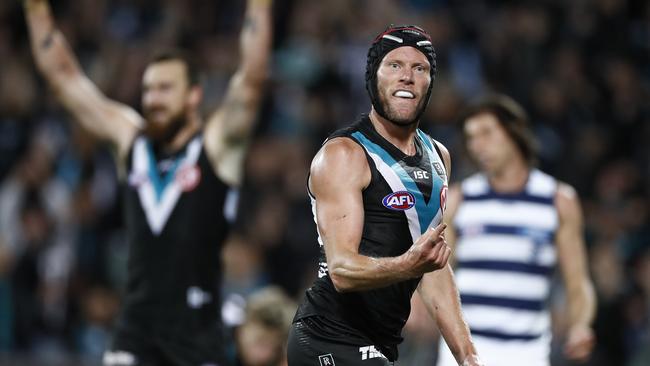
In January, the league doubled concussed players’ compulsory lay-off from six to 12 days – less than a week after revelations ex-Richmond and West Adelaide player Shane Tuck had a severe case of the degenerative brain disease chronic traumatic encephalopathy (CTE) when he died suddenly last year, aged 38.
Former St Kilda captain Danny Frawley and Geelong champion Graham ‘Polly’ Farmer, who both died in 2019, had the same condition.
Even though Ebert is feeling good and has been over his concussion symptoms for several months, Tuck and Frawley’s diagnoses have given him more perspective.
“I’m not sitting here stressing about it … but obviously when those things happen it does worry you a bit,” he says.
“But I just live my life – I’m not going ‘oh my god, this is definitely my path’.
“I’m keeping active, busy and mentally fit, and I feel healthy.”
Throwing himself further into his business, Hey Diddle Wines, with Port Adelaide captain Tom Jonas, is a key part of his next phase.
Ebert is working three days a week, as the company sells into Victoria, New South Wales, Tasmania and WA.
They have eight different varieties on the market: three whites, four reds and a tawny port.
His and Jonas’s vision is to establish a winery.
“It’s been good to transition into something else that I’m passionate about that I can learn from and probably gives me time to weigh up some stuff,” says Ebert, whose official title is director.
“I can clean a few things up we let slip last year through COVID because we weren’t allowed to do much, we were stuck in the bubble and weren’t really able to get out and do much selling or making or be part of the whole process.”
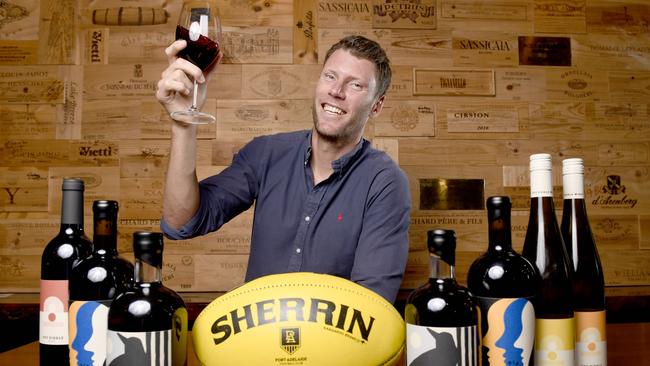
Aside from his commentary and wine business, Ebert is enjoying spending more time with friends and family, including Leo, Bec and their other son, Henry, 2.
They live in Adelaide’s western suburbs, near the beach, where Ebert skateboards to his local cafe.
But they are open to moving to the UK, where Bec’s family is from, or France, which they have enjoyed visiting, for their next adventure.
As for his boys following in the family footsteps by playing footy, Ebert does not mind, despite how his career ended.
If Leo or Henry want to do so and possibly wear the No.7 guernsey – donned by him and his uncle, Port Adelaide legend Russell Ebert – Ebert will be watching from the sidelines
“I’d be happy with the boys playing footy in the future but I’m certainly not going to force them down that path,” he says.
“I’ll happily let them choose.”
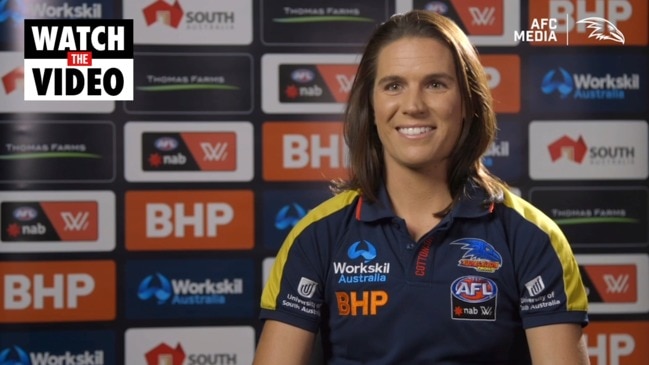
‘Narrative shifting’: Why Ebert backs concussion protocols
Former Port Adelaide star Brad Ebert has backed the AFL moving its pre-finals bye to the week before the flag decider but says it should not just be done to help concussed players feature in the big game.
Ebert was forced into retirement after repeated concussions, including one in his last match, the Power’s six-point preliminary final loss to Richmond in October.
The league has since doubled its mandatory minimum break for players diagnosed with concussion from six to 12 days — a rule preventing Adelaide captain Chelsea Randall from lining up in the AFLW grand final on Saturday.
Coaches have discussed the merit of pushing the bye back three weeks, in part to reduce the chances of the protocols sidelining players for the season finale.
Ebert, who Port Adelaide would have stopped from playing in last year’s grand final, even if it had beaten the Tigers, liked the compulsory 12-day lay-off.
He would support moving the bye, as long as there were other factors behind it.
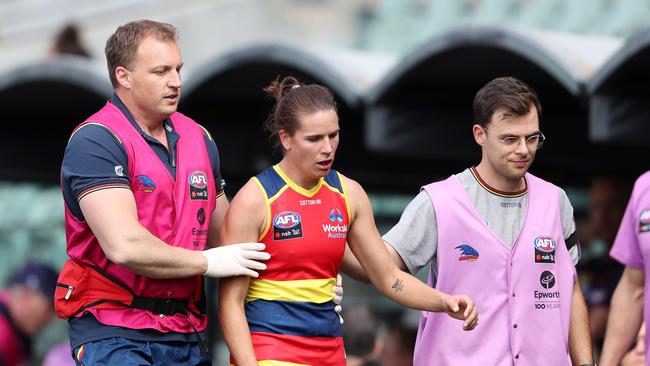
“I think there’s a number of reasons why it could be brought in and there’s definitely some pros for the AFL to be looking at it,” Ebert told The Advertiser.
“To just bring it in because AFL players are being concussed and it’s not fair on those players – well, it’s not really fair on players who break their arms in a prelim final.
“If you do move the bye, it definitely helps freshen players up and give them a better chance to prove their (fitness) and it also probably builds that excitement and hype.
“It’s a tough one and the unfortunate situation is it’s happened straight away with Chelsea.”
Richmond coach Damien Hardwick this week used Ebert as an example of why a player concussed in a preliminary final automatically missing the next week did not sit well.
Ebert, whose last on-field act was a courageous spoil to stop a goal, said it would have been incredibly tough to be ruled out of last year’s decider with concussion if Port made it.
But he said doubling the compulsory period for concussed players to be sidelined was a positive step for the league and 12 days was an appropriate amount of time.
“There was a lot of grey area last year when I was getting knocks around when you can come back and what you have to do,” said Ebert, who played 184 games for the Power and 76 for West Coast.
“With a hamstring they know this is how long it’s going to be.
“But with a concussion it’s really ‘you got knocked out, how are you feeling?’ If you’re desperate to play (it is) ‘yep I’m feeling fine’.
“I was one of the cases where I did just try to push back at times when I should’ve just let it recover.
“You’ve got the 12 days to at least have off and if you’re still having side-effects, we need to keep extending that.
“It takes that decision out of their (players’) hands.
“You miss one game and then if you’re ready to go by the second game, you’re OK.”
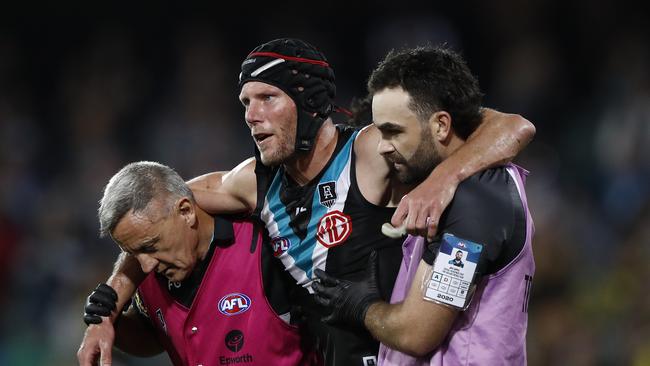
Randall, who sustained a heavy knock in Saturday’s preliminary final, accepted her fate, saying taking further action would have sent a poor message to grassroots football because concussion was serious issue.
Speaking in a video on Adelaide’s website, she recalled watching a young amateur footballer who had been bumped the week after a concussion and been approved to play die in front of her a decade ago.
Randall used the anecdote to further educate people about the dangers of head knocks.
Ebert believed community competitions and junior associations needed to consider adopting similar protocols to the AFL to rule concussed players out for a game.
“When I was growing up it was ‘you’re tough’, you wear it as a badge of honour when you get hit in junior grades,” said Ebert, who was first knocked out the year before he got drafted.
“I think the narrative is shifting in that space and a lot of that is coming from the awareness of the top level, and it trickles down.
“Even if it’s just a father who’s coaching a team who sees an incident, pulls a player out and has a bit more of an educated eye on it, rather than ‘he’ll be fine, just play it out’.
“Taking that emotion away is what I’d recommend.”
More Coverage
Originally published as Former Port Adelaide star Brad Ebert opens up on league’s concussion protocols, retirement and life after footy




